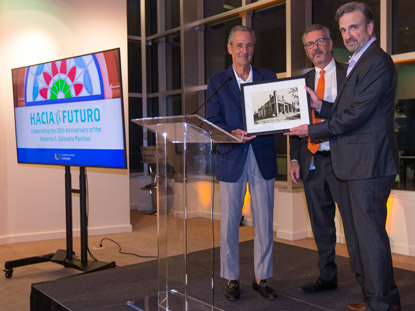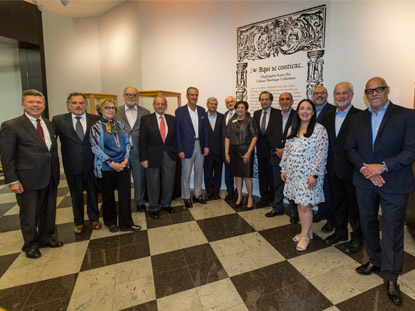Mission & History
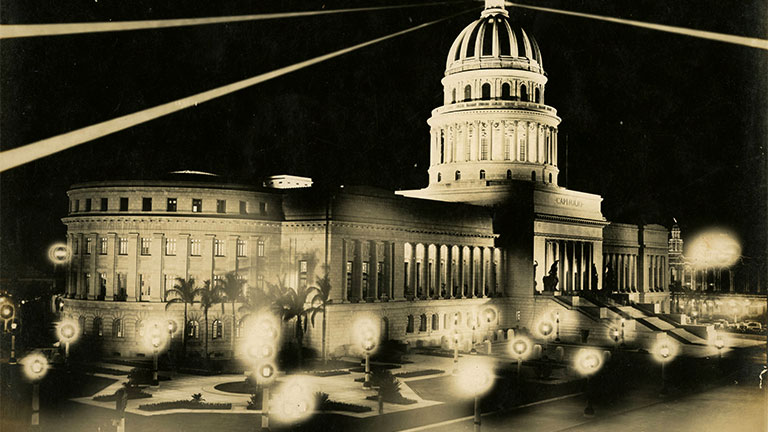
The Cuban Heritage Collection (CHC) at the University of Miami collects, preserves, provides access to, and supports research in primary and secondary sources of enduring historical, cultural, and artifactual value that relate to Cuba and the Cuban diaspora from the colonial period to the present. CHC serves as a center for knowledge preservation, creation, and dissemination for the Cuban diaspora, the scholarly community, and the broader public. In that spirit, the Collection aims to strengthen its position as a leading site for the promotion and discussion of research in Cuban Studies.
The work of the Collection focuses on the following programmatic areas:
- Collection Development: cultivating a world-class collection of research resources, including books, periodicals, manuscripts and archives, and digital collections.
- Preservation, Access, and Research Services: safeguarding the Collection’s holdings and making them widely available to students, scholars, and the public.
- Academic Programs: awarding fellowships and grants that support innovative research, as well as hosting conferences, symposia, and seminars that highlight pathbreaking scholarship in Cuban Studies.
- Teaching and Learning: facilitating course-based instruction with collection materials for University of Miami students and faculty, including those affiliated with the undergraduate Program in Cuban Studies.
- Community Programs and Outreach: developing programs, exhibitions, and events that educate broad audiences about Cuban history, culture, and affairs from diverse, multidisciplinary perspectives.
History of the Cuban Heritage Collection
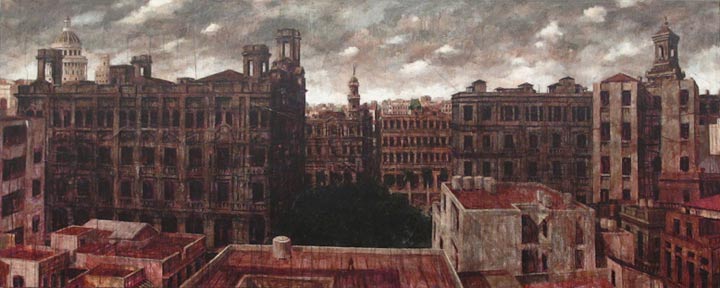
The motto of the University of Miami in the early years – ‘North American culture for the Latin Americans and Latin American culture for the North Americans’ – exemplifies the relationship that the University of Miami would sustain in the coming years with its neighbors to the south. As early as 1926, faculty from the University of Havana came to teach at the University of Miami. The University’s collection of library materials related to Cuba grew to support course work and scholarship in Latin American and Caribbean studies. The rate of growth and diversity of materials greatly expanded in the early 1960s when thousands of Cubans came to live in the United States.
Cuban materials were located throughout the University of Miami’s Otto G. Richter Library, which was dedicated in 1962 and included a reserve collection of Cuban books. The quality of the materials in the collection during the early years of the Library reflects the knowledge and talents of Charles Lewis Morgan, who was head of acquisitions, and J. Riis Owre, Dean of the Graduate School and one of the founders of the University’s Pan-American Institute in 1927.
In the 1960s, Library Director Archie L. McNeal hired two exiled Cuban librarians, Rosa M. Abella and Ana Rosa Núñez. Supporting their quest to collect Cuban materials and document the Cuban experience in exile, he became the first of several library directors to recognize the unique asset this represented to a research institution. With the growing acquisition not only of books but also of periodicals, maps, posters, photographs, and other materials, the library’s Archives and Special Collections Department established the Cuban Collection in 1980 with Esperanza Bravo de Varona as its archivist. Members of Miami’s Cuban community recognized the uniqueness of the Cuban Collection and in 1995 formed the Amigos, a membership group that raises funds to support the collection’s mission.
The collections documenting Cuba and the Cuban diaspora expanded to become the most important body of resources on these topics outside the island. In 1998 the vast and growing collections were brought together as the Cuban Heritage Collection.
Thanks to a $2.5 million challenge grant from The Goizueta Foundation and additional support from the late Elena Díaz-Versón Amos and the Fanjul Family, the 10,000-square-foot Roberto C. Goizueta Pavilion was inaugurated on January 28, 2003, as a permanent home for the Collection.
In 2005 the University of Miami Libraries received an anonymous gift of $1.5 million to endow the Esperanza Bravo de Varona Chair of the Cuban Heritage Collection, in honor of Professor Esperanza B. de Varona, a key force in building the Collection.
The Goizueta Foundation again gave its support in 2009 with a five-year grant of $2.4 million to support collection development, preservation and access, digitization, and fellowship programs at the Cuban Heritage Collection. A subsequent $2.6 million gift in 2019 established the endowed Roberto C. Goizueta Distinguished Presidential Scholar-in-Residence Program.
In 2019, the University of Miami officially recognized the hard work of the five visionary women who were instrumental in the founding the CHC: Rosita Abella, Esperanza Bravo de Varona, Lesbia de Varona, Ana Rosa Nuñez, and Gladys Gómez Rossié. Their legacy was celebrated at a beautiful reception; Nuestra Herencia: Honoring the Founding Women of the Cuban Heritage Collection hosted by President Julio Frenk and Dean of Libraries, Charles Eckman.
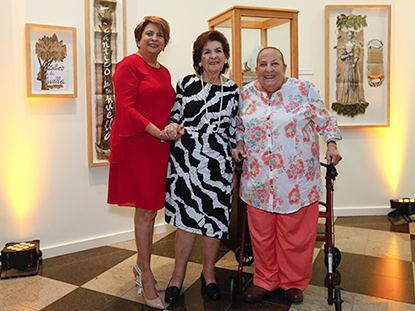
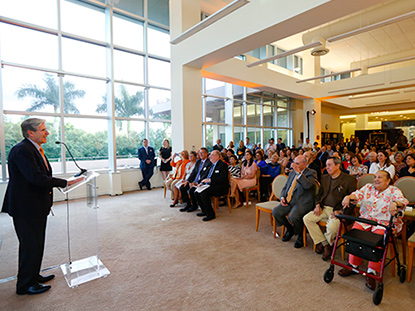
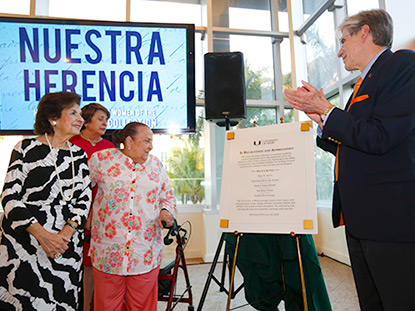
The Collection celebrated the 20th anniversary of the Roberto C. Goizueta Pavilion in January 2023 at the Hacia el futuro reception hosted by Provost Jeffrey Duerk and Dean Charles Eckman.
